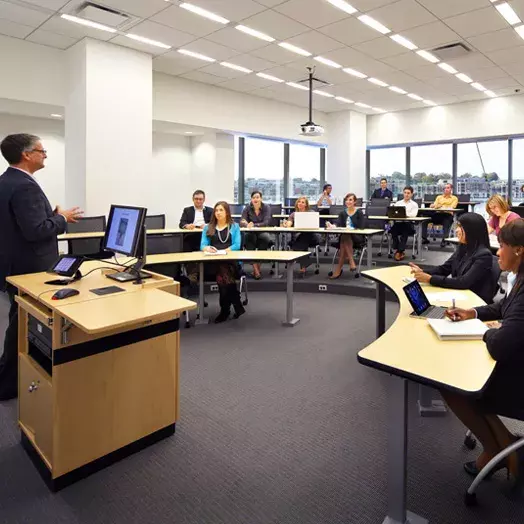
Carey Visiting Professor’s Report Outlines Challenges, Opportunities for WTO
Faced with the lack of a coordinated approach or collaborative strategy, together with a debilitating U.S.-China trade war, the World Trade Organization (WTO) is in critical need of revival and redirection, according to the recently released “24th Global Trade Alert Report,” co-authored by Simon J. Evenett, former DLA Piper Distinguished Visiting Professor at the Johns Hopkins Carey Business School.
In 2016, global law firm DLA Piper began funding a distinguished visiting professor to teach at Carey each year.
Evenett, who joined the ranks of the Carey faculty for the spring 2019 semester, is professor of International Trade and Economic Development at the University of St. Gallen, Switzerland. His report, co-authored with Johannes Fritz, Max Schmidheiny Foundation Research Fellow, University of St Gallen, is entitled “Jaw Jaw not War War Prioritising WTO Reform Options.” World leaders met in Osaka, Japan, June 28 and 29, for the G20 Osaka Summit 2019, and a key item on their agenda was to “revive the moribund WTO,” according to the report. “There is no apparent organising logic, nor any systemic perspective” being exercised by the WTO, the report states, and the festering U.S.-China tariff tit-for-tat “has absorbed bandwidth that could have been usefully deployed elsewhere,” it continues.
Members of the Global Trade Alert team act as “independent monitors” of trade policy. Their latest report illustrates that cooperation between the world’s trading partners has suffered since the last G20 Leaders Summit, in 2018. “From 1 December 2018 to 15 April 2019 G20 governments imposed trade distortions affecting over $1.15 trillion of global goods trade, up a quarter of trillion dollars over the year before and double the annual rate of the three previous periods,” the report states. Interestingly, accord to the report, the U.S. and China account for only one-sixth of G20 trade distortions implemented during that time. It is clear that nations across the globe, both G20 members and non-members, have resorted to protectionist measures, to the detriment of world trade, and, ultimately, economic growth.
Evenett and Fritz propose “multi-sector accords” to start breaking down the walls and re-establish viable and mutually beneficial trade practices. These accords, they maintain, “… can generate gains for large swathes of the WTO membership, including all of the big trading powers [such as the U.S., China, Japan, France, the UK, Canada, and Germany – known as the G7]. A new WTO work programme,” say the authors, “should focus on certain well chosen sectorial deals.”
The report also states that long-range, evidence-based planning has too often given way to expediency. “Failure to systematically consider reform options in an evidence-driven way has been a recurring flaw –all too often the urgent superseded the important,” according to the authors. They add, “The reform options highlighted here [in this report] demonstrate that governments working together through the WTO can still accomplish a lot more than going it alone.”
The report’s authors saw the Osaka summit as a strategic opportunity to revive the WTO and begin restoring it to its “pre-crisis state. Doing so,” they maintain, “would follow Winston Churchill’s famous dictum: Meeting jaw to jaw is better than war.”


